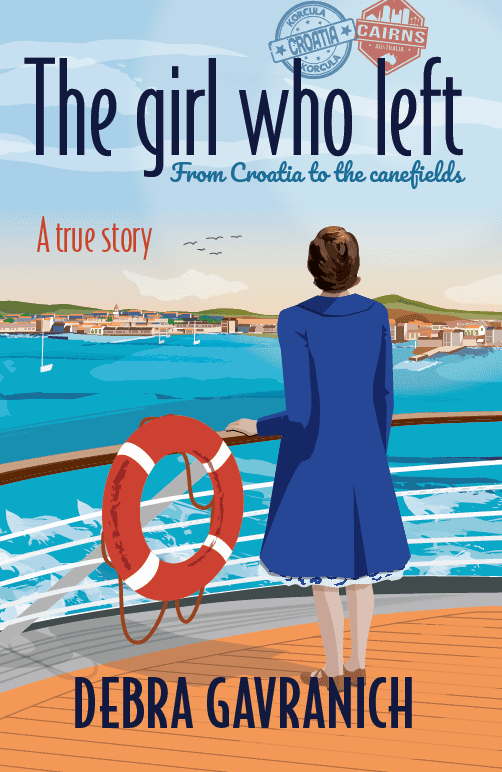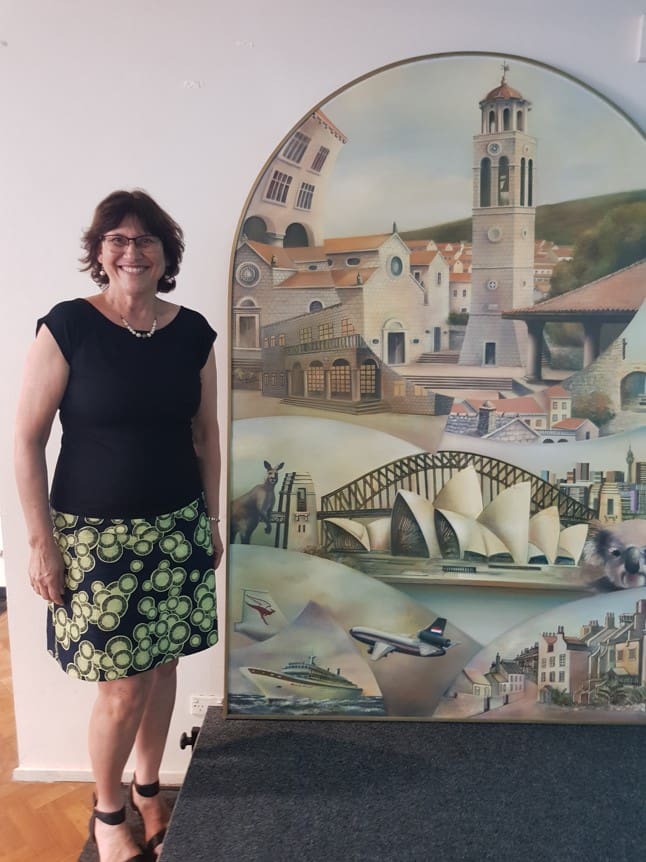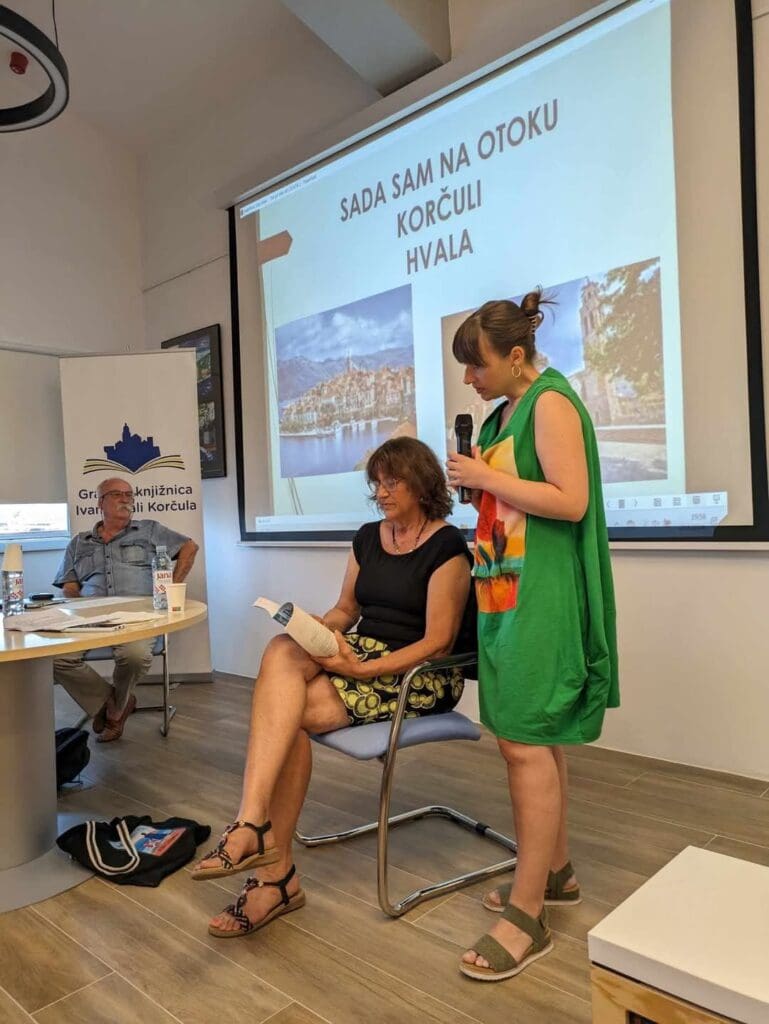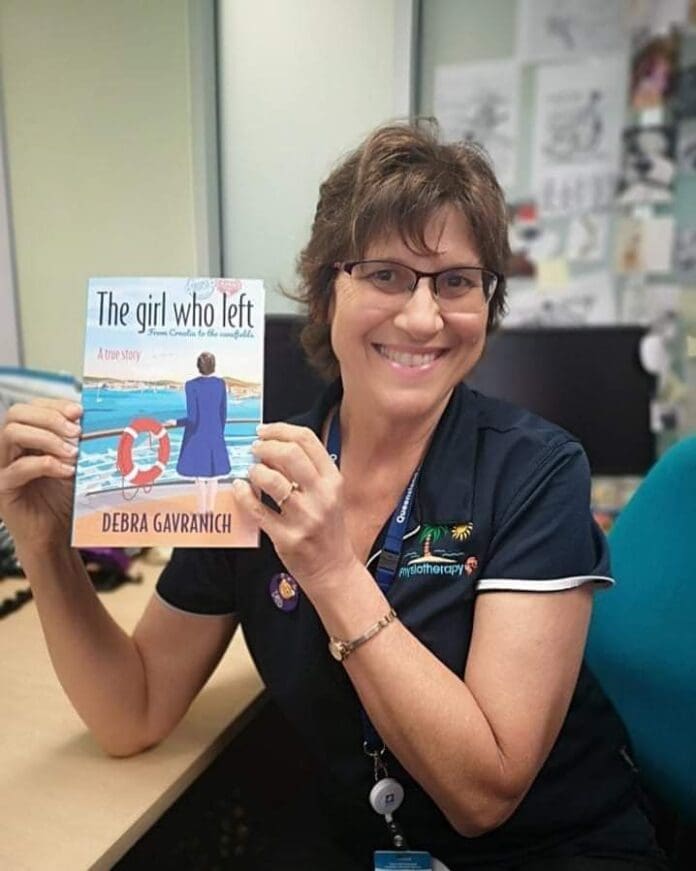An Interview with Debra Gavranich, Author of ‘The Girl Who Left’
Photos: private album Debra Gavranich
Debra Gavranich didn’t set out to be a writer. But the story of her mother Maria, a young woman from the Croatian island of Korčula who crossed the world in search of a new life in Australia, was simply too powerful to be left untold. What began as a deeply personal project has become a widely celebrated book—The Girl Who Left—that has touched readers across generations, cultures, and continents. We spoke with Debra about her upbringing, the journey of writing her mother’s story, and the unexpected response the book has received.

Can you tell us a bit about yourself and your journey as a writer?
I grew up in Far North Queensland on a sugarcane farm in Cassowary Valley, a small valley in between Mossman and Port Douglas. It was an idyllic childhood and I was part of a very loving family. I am the youngest of four, with two older sisters and an older brother. Both my parents were from Blato on the island of Korčula. My father was a young boy of about five when he emigrated with his family so he grew up very Australian. For example, although his name was Mladen, everyone called him Laddie. Despite this, Croatia and the Croatian culture was very strong and important in our home growing up.
My siblings spoke Croatian as their first language but unfortunately by the time I was born, more English was spoken as my siblings were at school. To this day I am sad that I was not fluent like them.
Resilience, Heritage, and the Migrant Journey
What was it like growing up as the child of Croatian immigrants in Australia?
Growing up in a Croatian household seemed very normal for me as many of the other farming families in Cassowary Valley were also Croatian and the children all had a ‘Baba’ and ‘Dida’ like I did. Although it was a small town and did not have a Croatian Club like the larger cities, we had our own Croatian community with the other Croatian families and my father’s cousins. Having said that, my parents were well assimilated and had many Australian friends as well.
I felt proud growing up as a child of Croatian immigrants. I was fortunate that I never experienced racism. This may have also been due to the fact that Mossman was also home to many ethnic migrant families, mainly from Italy and Croatia. My mother, Maria, had left all her family behind so we grew up knowing all about our many cousins, aunts and uncles in Croatia and my mother was in constant contact with them via mail. My older sister actually corresponded in Croatian to our Dida in Blato. How special!
I loved that another language was spoken in our home; that I had elderly relatives and family friends that did not speak English; that my mother spoke English with a strong accent and could not pronounce certain words; that my mother could not write English; that we ate different food in our home and that we had a strong connection to a country far away called Croatia.
What inspired you to write The Girl Who Left?
Growing up, I always thought that my mother’s story was like a fairy story, almost like Cinderella. Her childhood was full of hardship as war (World War 2) came to her country when she was nine. Initially her island was occupied by the Italians and then the Germans. Her sister, like many others in her village, ran off to join the partisans and as a child she helped the partisans in the hills.
Her school was taken over by the Italians and then closed. She had no food and they boiled grass in salt water to eat. She saw killings and torture. Her childhood was full of fear and hunger. After the war she agreed to a proxy marriage to a man from her village who had left as a child and immigrated to Australia. They corresponded, sent photos and a proxy marriage was held in Blato with a proxy groom standing in for my father. She eventually met her husband a year later when she travelled by boat from former Yugoslavia to Australia. She left behind her family, friends and all that was familiar and dear to her.
This story fascinated me and I always knew that one day I would write this story. Life got busy and unfortunately both my parents died when they were young. I was sad that my children never knew their Croatian grandparents so eventually I sat down and started researching and writing. I wrote this story for our own family and was going to self-publish. I did not think anyone else would be interested. How wrong was I! It has been embraced by so many that I now know that it is meant to be read by many as it is representative of so many brave migrants.

How did you go about researching your mother’s journey and the historical context of the time?
It was quite difficult to research this story because by the time I began to gather information, both my parents had passed on. My mother had told us some stories of her childhood during World War 2. Luckily, my godmother who was also a proxy bride, lives close by (near Tully) and was a great source of information about life in Blato during World War 2. I also travelled to Croatia several times, interviewing my aunts, uncles and cousins. I found resources in the Blato library that chronicled in great detail, the events that occurred in Blato during the war. This was invaluable.
In Australia I spent many hours interviewing the locals, many now in their 80s and 90s, that knew my mother and they told me many stories about her arrival and her life as a young proxy bride in Mossman. Some of the stories I found quite emotional as they were events that our mother had not revealed.
What was the emotional impact of writing such a personal story?
Although there are sad parts to my mother’s story, she was a woman of faith and hope, always grateful and with a contagious zest for life. ‘The cup was always half full.’ I found writing this story very cathartic. It was empowering to put on paper my mother’s life story as she was an exceptional woman and I feel so proud that she was my mother.
The Girl Who Left explores themes of migration, identity, resilience, and womanhood—were these themes intentional from the start?
The themes of migration, identity, resilience and womanhood are intentionally woven throughout this story because that describes Maria and her life. When I sign copies of my book, my standard sentence is ‘Enjoy this story about a strong, migrant woman’. I include the word ‘local’ if the book is for someone from Far North Queensland as I think this makes it even more personal to think she lived in Mossman and then Cairns.
How much of the book is drawn from true events versus creative interpretation?
I was as thorough in my research as possible, as this is the true story of her life and events that happened during her life. It was important to get the facts right.
Preserving Memory for Future Generations
Have you visited Croatia? What was that experience like personally and as a writer?
Croatia is in my heart. Although a proud Australian, I am very aware of my heritage and that all my ancestors (both mothers and fathers) come from Blato. Many of my family (and all my mother’s family) still live in Croatia. I have recently received my citizenship and have been assisting my children, siblings and cousins on this journey.
From when I was a little girl, I always spoke of visiting Croatia and meeting our Croatian relatives. As a 22 year old, I travelled to Europe, the highlight of this trip being the time spent in Croatia. As soon as I stepped onto Korčula I felt that I had come home. I don’t know how to describe it, but I felt it in my bones. I felt that this was where I truly belonged. It was a very emotional moment. I have spoken to other diaspora who say that is how they felt too.
When my book was published, the librarian from Blato told me that my descriptions of Blato were so accurate, it was like I had grown up there. This was such a compliment to me.

What reactions have you received from readers, especially those with similar migration backgrounds?
The girl who left was supposed to have been only for my family. I was going to self-publish and print maybe 300 copies and force all my family and friends to buy a copy. Cathi Lewis (from Melbourne) and her company, Wild Dingo Press, published it in August 2021. Since then we have been on a wild (in the best possible way) journey. It has been immensely popular, sold 1000s and 1000s and 1000s. I have lost count but know that we are into our 26th print run … I think.
The diaspora have embraced this story. This was very important to me. I think it is seen as a story that represents many and I have had numerous people contact me saying that this was their story, or their mothers’ or grandmothers’ story. I have been invited to speak at many writers’ festivals, Croatian clubs, schools and community events. I have been interviewed countless times both in Australia and overseas.
Has writing this book changed your relationship with your family’s history or your mother’s legacy?
I have had so many people talking about my mother, I almost feel she is back with us. I feel that she is looking down on me, this book and this journey and saying ‘well done, darling’.
The success of this book has surpassed my wildest expectations. A song has been written about Maria and the musician has used typical Croatian instruments so that it sounds very authentic. Many tears have been shed by those who have listened to it. I have been asked time and time again if The Girl Who Left will be made into a movie. Who knows? Maybe this will happen.
My ultimate goal for this book is for a Croatian publisher to buy it and publish it in Croatia in the Croatian language. This is important to me. My uncle, my aunt and many of my cousins in Croatia cannot read English. As my book is currently only available in English, they have not been able to read it. My aunt and uncle are major characters in the story and it saddens me that they have not been able to read it, only have some passages translated for them.
Do you have any plans for another book? What advice would you give to others looking to write about their family’s past or cultural heritage?
At this stage I have no desire to write any more books. Working as a physiotherapist and am passionate about my job and I had no desire to be an author but I did have a desire to write my mother’s story and preserve it for the generations to follow. I have achieved this and am more than satisfied with the result.
I would advise many of the diaspora to record their family’s story, whether recording the elderly and their experiences so it is on record for later use, or take notes and I strongly believe that these incredible stories need to be told or they will forever be lost. Australia is a country of migrants from the not too distant past. It is the strength of these people that has been woven into the tapestry of what Australia represents today. These stories must live on. Our Croatian culture is strong and we are proud of it.
The Girl Who Left is more than just a memoir—it’s a moving tribute to the courage, faith, and love that define the migrant experience. Through her mother’s story, Debra Gavranich has captured a legacy that continues to inspire and connect generations of readers.
Links to purchase the book:
https://www.booktopia.com.au/the-girl-who-left-debra-gavranich/book/9780645140521.html
https://www.amazon.com.au/girl-who-left-Croatia-canefields/dp/064514052X
Follow The Girl Who Left on the official Facebook page for updates: https://www.facebook.com/thegirlwholeft/

